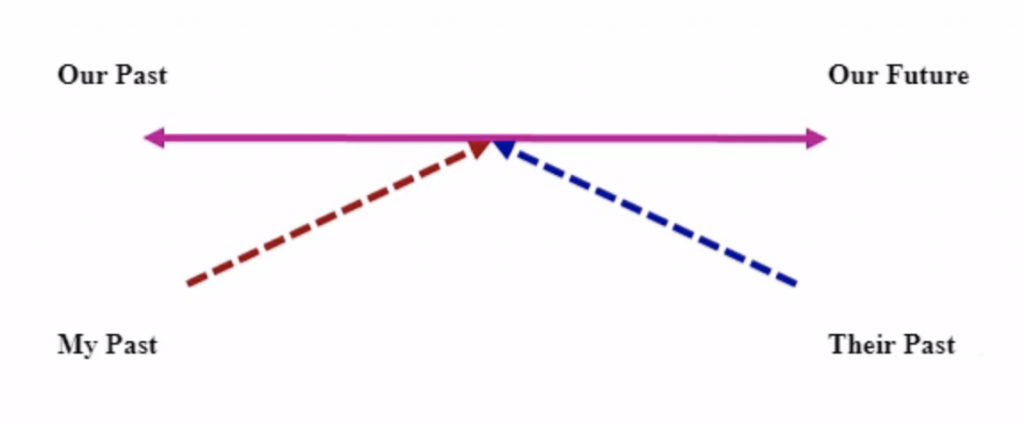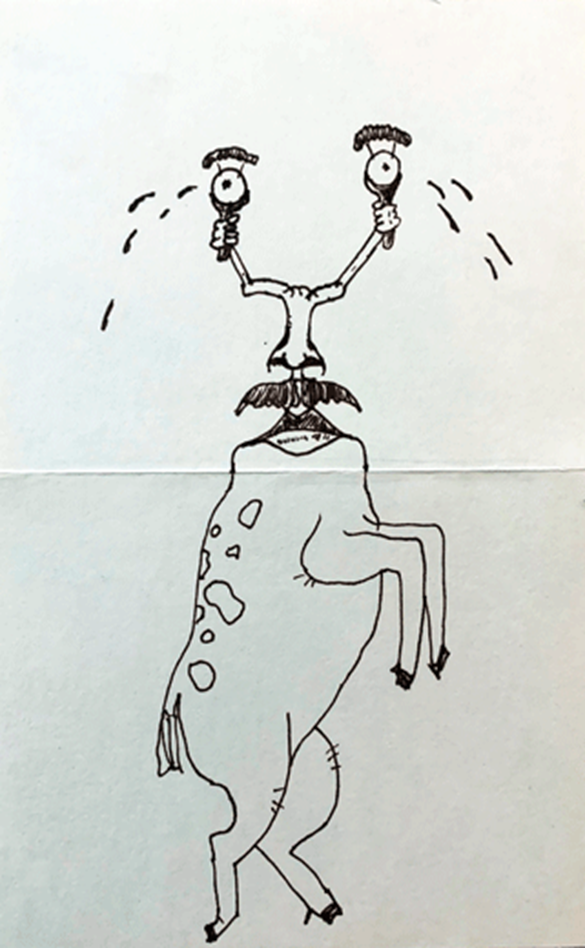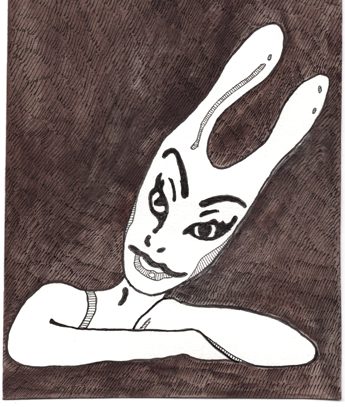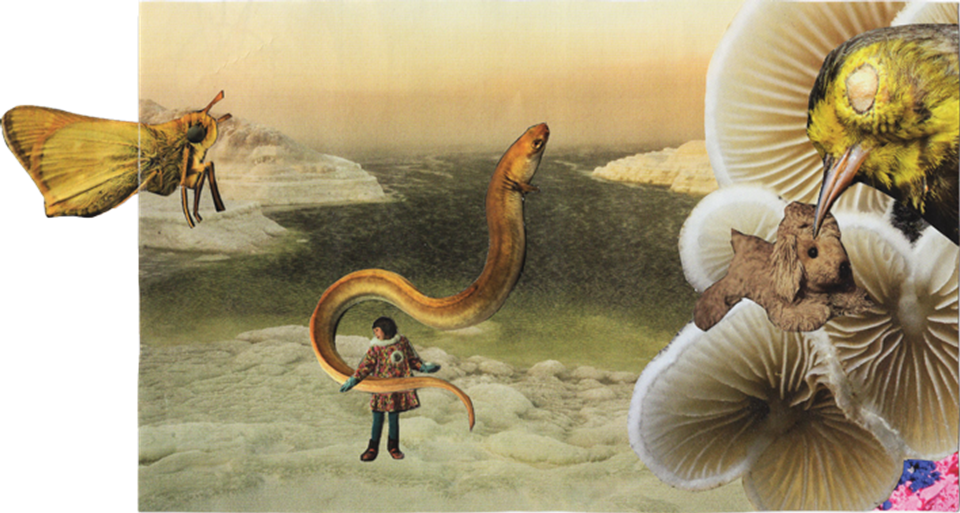Excerpt from Disease is a Mirror (unpublished)
The Student
I lay on a high table, likened to a padded corpse presentation trolly, shivering and pants-less, under many blankets, and watched as two people broke heating packets and then piled them onto my socked feet, checking my temperature with each added layer. They walked away twice to get more. My naked limbs had to warm to at least 91°F before they could complete the Electromyography / Nerve Conduction Velocity (EMG/NCV) procedure, which would later definitively rule out a pinched nerve.
Finally at temperature, the Technician repeatedly jabbed and twisted a magician’s wand-length needle into various parts of my exposed lower half, explaining my reflexes to the Student. This needle was a microphone, generating and recording the sounds it inflicted in my body. The Technician and the Student listened to the click, clicking electrical impulses and the thunderous electro-shocked nerves, while pointing at a monitor displaying wavelengths.
The Student complimented my engagement ring as “unusual,” a garnet, and in a cold sweat, a limb recently descended from a forced shock, I answered “thank you.”
Interpretations
From an analogy perspective, Multiple Sclerosis: multiple scars.
From a computer science perspective, Multiple Sclerosis is the output of a flawed program. When learning a programing language, first understand that computers are dumb. They may seem to be magical, all-knowing-machines-of-the-future, but computers really only do exactly what the programmer tells them to do. Similarly, the mortal body is a magical, all-knowing-machine-of-the-ages, and sometimes it’s also incredibly dumb. My immune system, bless its heart, attacks illnesses the best it can, and if “illness” isn’t clearly defined, it attacks those dangerous-looking, but actually innocent and delicate, coverings of my nerves, thus, causing the body program to break down, as it overcompensates and harms itself.
From a playground rules perspective, when my body attacks itself, it’s a form of: Why are you hitting yourself; why are you hitting yourself; why are you hitting yourself.
From an it-is-because-it-isn’t perspective, I have Multiple Sclerosis because MS remains after learning I don’t have (at minimum): a broken bone, Diverticulitis, HIV, HPV, Lupus, Lyme disease, Neuromyelitis Optica, a pinched nerve, Rheumatoid Arthritis, Sciatica, Sjogren’s, a stroke, Syphilis, a thyroid issue, a urinary tract infection, or Wegener’s Granulomatosis.
From a “knowing” perspective, I’m relieved to finally know what problem I’m solving. I now need to learn how to appreciate managing a problem that can’t be solved.
From a classification perspective, Multiple Sclerosis is a disability.
From another classification perspective,
public class Identity {
String illness;
String refrain;
// Define identity.
public Identity(String primaryIllness, String repeatedWords) {
illness = primaryIllness;
refrain = repeatedWords;
}
// Assign our identities.
public static void main(String[] args) {
Identity myDad = new Identity("cancer ","I must take care of these two girls ");
Identity myMom = new Identity("dementia ","Where is my man? ");
Identity me = new Identity("multiple sclerosis ","multiple sclerosis ");
// Define poetry by what it isn’t.
boolean dadIsItPoetry = !(myDad.illness == myDad.refrain);
boolean momIsItPoetry = !(myMom.illness == myMom.refrain);
boolean meIsItPoetry = !(me.illness == me.refrain);
// Whose identity is poetry?
System.out.println("There was a dad who died of " + myDad.illness + "and who often
repeated the words: " + myDad.refrain.repeat(3) + "... Is it poetry? "
+ dadIsItPoetry);
System.out.println("There is a mom who lives with " + myMom.illness + "and who
often repeats the words: " + myMom.refrain.repeat(3) + "... Is it poetry? " + momIsItPoetry);
System.out.println("Their youngest of two girls lives with " + me.illness + "and will
often repeat the words: " + me.refrain.repeat(3) + "... Is it poetry? " + meIsItPoetry);
}
}
From an inner child perspective, Multiple Sclerosis is my fault, because one time in second grade, instead of telling my parent about a wart on my hand, I stopped touching people and I nibbled at it, consumed it, hoping it would go away without having to talk about it, just as an adult, I still nibble at and internalize my problems, away from others, as a something eats away inside of me.
From a continuity perspective, I can never know the start of my story, because MS scars can’t be dated (only guessed at with a series of MRI scans) and none of the previous attacks showed themselves outwardly at their time. Multiple Sclerosis is part of my life now; it was my inevitability. Therefore, even though MS didn’t always exist in me, it may as well have, and a timeline is misleading. When I fell in love with Pete, I knew that I wanted to spend forever with him. Forever included not just the rest of our lives, but also the rest of our pasts. I wouldn’t change my past or his, because each of our separate moments (even with other people) brought us to the joint moment when we would be perfectly right for each other. I like the concept of us having a shared infinite future with a shared infinite past, branching from the time of us finding each other. Perhaps MS found me at the perfect moment that I needed it to slow me down, revealing its upheaving existence while revealing my true self, my past, my future, our past, our future.

From an art history perspective, Multiple Sclerosis is a form of process art in which the body deftly carves away at the coating of nerves until they shine brightly with magnetic resonance imaging, displaying asymmetrical, unpredictable, permanent patterns.
From a found poetry perspective, Multiple Sclerosis is an erasure.
From a dreamscape perspective, Multiple Sclerosis is bunny rabbit and basement fire.
Oct 1
Dressed in scarfed business finery and strut-shuffling with the cane on my usual office building path to a two and a half floor side elevator reserved for those with carts, luggage, strollers, and mobility issues, I was struck by how pristinely cold and numb my left leg felt. As the elevator doors closed in front of me, I realized it was the leg of a cadaver.
As a Child: Part 1
One of my first memories includes waking up in a hospital bed. I saw children of various heights standing across the room, huddled in a group, each of them squinting their eyes at me and giving low waves before they continued their tour of our ward. When I refused to take my medicine, a nurse gave me ice cream and insisted that I finish it. I was told I contracted pneumonia from my mom. I was not told she would visit.
The Exquisite Corpse
- Fold a piece of paper in half.
- Pete usually takes the top half, drawing a face and upper torso, and then slightly extending a couple lines from the image, past the fold, into the other half.
- Keeping Pete’s half hidden, I draw a bottom half on my mostly blank portion, incorporating the guiding lines provided in Step 2.
- When complete, we rejoin, unfold the paper, and reveal our creation: an exquisite corpse, a surrealist game of sequential collaboration, a practice for in-home needle injections.
- Repeat.
As a Child: Part 2
The ritual of being tucked into bed temporarily included me asking my dad to open my closet, so that the door’s full-length interior mirror faced me in the moments just before sleep. It was important to me that he apply this mirror placement and to set it in such a way that I clearly saw my face in the center of the reflection. There was something I wanted him to know about me in this ask. But he misunderstood.
After the third night, my dad, a single parent with no one to bounce ideas off of, voiced his discomfort with supporting the potentially “unhealthy” act of staring at one’s self, a “vanity” maybe. In turn I chose to stop asking for my dad’s participation in my secret ways.
I hid my reflections about who I was becoming.
I hid how I coped with loneliness in an often-empty house.
I hid befriending and mothering myself.
I hid my hopes before the realities of dreams.

Perfection is Grotesque and
Striving for it is a Personal Horror
Sometimes I feel sorry for myself for having MS. I deliberately work to keep those times to an abbreviated rarity, acknowledging the feeling and then falling back on creating or learning something, so that energy spawning from pity is repurposed into pride and love, and I remember who I am.
I Am

On an extended train ride, traveling alone to tour a liberal arts college in 1997, I was 17 years old, staring out the window, occasionally drawing in my sketchbook, wearing headphones, and listening to Radiohead’s OK Computer on repeat. I would describe my style as “romantic arthouse rebel” (or, for those not interested in the nuances of personal style, “goth”). Today’s attire was no exception: white mohair sweater, long black A-line skirt, unintentionally smudged black eye makeup, mid-calf heeled black boots, and bob haircut. I remember feeling very much of myself, comfortable and in my own world.
After a time, I removed the headphones, stuffed my belongings into a satchel, and started a walk to the food car. On my way I passed a group of seats facing each other, bursting with four energetic guys, which I can best describe as “college dudes.” They animatedly chatted about something, which I assumed was sports-related or something equally unrelatable. After grabbing snacks, I returned to their car, and immediately noticed that the dudes had oddly quieted down, not speaking except for a couple whispers amongst themselves. This time when I passed them, one said to me “this is for you” or “this is you” and handed me small a cutout image.
Caught off guard and unsure if they were making fun of me, I took the briefest of glances at the paper, not enough to process it, and said “thank you.” I then continued back to my car, keeping my same confident pace as best I could. Back in my seat, I took a breath and had a longer look. It was an image of a woman, tilting her head and giving a toothy smile while wearing a bizarre, perhaps fetishy, rabbit mask.
I didn’t know what to make of it and I didn’t have the courage to go back and ask. I’d been told I was ugly enough times by boys to not invite the thoughts of an entire group of “dudes.” I took a closer look at my own attire as a possible clue to this seemingly purposeful gift. I suppose a “dressed up” black and white ensemble could make one think of this black and white image and I liked the bizarreness of the rabbit mask. I questioned if I exuded a sexuality that others felt they were invited to respond to. I was a teenager, and I had no idea how people saw me; as an adult, I mostly still don’t.
What I can assume with 93% certainty is that this image was not a coded key into a secret society (which was one of my prevailing thoughts at the time); it was not a pact (we had no mutual understanding); it wasn’t even an invitation (if it had been, I think they would’ve tried to find me again). This image was likely just how they saw me and they couldn’t help themselves when they happened upon the perfect image to personify this someone walking by.
This image is now my silent contribution to the odd train stories never actually shared at dinner parties. Whether their intentions were pure, mean-spirited, flirtatious, or neutral, it doesn’t matter. I’m grateful for the gift itself and for the mystery, not the purpose behind it (which is ultimately unknowable and may be gross, anyway).
Instead, when I look at this image, I like what I see. “Rabbit woman” doesn’t feel exactly right; let’s say a “human snowshoe hare.” They were right; it is me. If ever I think I’m slipping into someone else’s normality or my own despair, I think about this gifted image. It reminds me that I’m noticeable, distinct, animalistic, curated, and I’m intrigued by the mystery of others from the safe distance of my internal world.
We Were
Contained at home, healing and fearful to leave because my treatments suppress my overactive immune system, my observed personal changes indoors through quarantine felt offensively superficial, while others fought the many horrors outdoors.
| Due to my bad leg, not moving around much, and an overuse of a weighted blanket, I tend to hobble. | Protesters across the country are being gassed, kidnapped, beaten, and slaughtered. |
| When Pete and I have virtual meetings or Euchre games at the same time, I join from a closet or the bathtub because, they’re the only spaces with a door. | Teachers, parents, and students are struggling through remote learning, the impacts of which may derail lifetimes of knowledge and educational infrastructure. |
| My hair is quickly whitening, and my Anna Wintour-inspired bangs grew out, so I’m embracing ornate headbands. | White supremacists are killing people and our hopes for embraced equality. |
| When wearing a mask, my glasses fog up, so I acquired contacts and red-hued eyeshadows that make my green eyes pop. | Millions of people are dying or are otherwise fundamentally changed by the coronavirus. |
During quarantine, I’m evolving into the paling and reclusive “woman in the attic,” perfumed and adorned, whose self-indulgent world is smaller than that of the watched rabbit in her courtyard, encircled by flames that cannot be dampened by dresses.
Things To Do
Anxiety can; therefore.
Woman in the attic – forlornness.
Woman in the attic – voluminous black ruffles caught in mirrors.
Woman in the attic – introspection and divination.
A pattern for a sewn purse to cover the red bin of used needles.
Farewell ritual for heels and an ushering in of ostentatious flats.
Collage of used Band-Aids. Upright or down?
Print MRI brain scans for erasure embroidery pattern.
Write it all down.
From a closed-door
perspective,
disease is self-harm.
From an open-door
perspective,
disease is a mirror.
I am continually healing from my first major MS attack; I am not returning to who I was before. I will change again, another major attack in the waiting, soon, if the projected timeline is to be believed. In the brief, infrequent moments we leave the house, when I walk at approximate pace with Pete, masked, in our Chicago neighborhood, which is itself healing and learning about not returning, I currently progress without the need of a cane. Instead, with each step, my legs feel a sensation of having just walked through cobwebs, prickly, a waking up.
January 2021, Chicago, IL

Back to Top of Page | Back to Excerpts | Back to Volume 16, Issue 4 – Winter 2022
About the Author
Emily Greenquist currently navigates life in a small town in Illinois. She writes fashion blog posts with Dorigen Lonergan on doremanswers.com, compiles lists of movies at listsofmovies.com, and creates art with Pete Greenquist, displayed on local-businessmen.com.